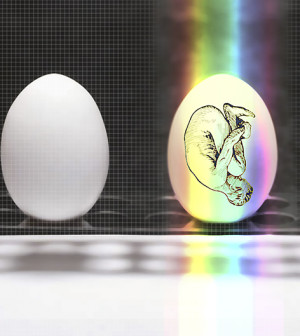- Could Your Grocery Store Meat Be Causing Recurring UTIs?
- Are You Making This Expensive Thermostat Error This Winter?
- Recognizing the Signs of Hypothyroidism
- 10 Strategies to Overcome Insomnia
- Could Artificial Sweeteners Be Aging the Brain Faster?
- Techniques for Soothing Your Nervous System
- Does the Water in Your House Smell Funny? Here’s Why
- Can a Daily Dose of Apple Cider Vinegar Actually Aid Weight Loss?
- 6 Health Beverages That Can Actually Spike Your Blood Sugar
- Treatment Options for Social Anxiety Disorder
Timing of Kidney Transplants Doesn’t Affect Pregnancy Chances


Pregnancy outcomes are similar for women who received a kidney transplant whether they were a child or an adult when they got their transplant, a new study says.
“This work has shown that outcomes for childhood transplant mothers are similar to outcomes for adulthood transplant mothers and should provide comfort to such mothers and their physicians that their early onset of kidney failure and longer period of posttransplant exposure to immunosuppression do not adversely affect their pregnancy outcomes,” the researchers wrote.
Researchers reviewed data on women in Australia and New Zealand who received a new kidney and got pregnant at least once between 1963 and 2012.
There were 101 pregnancies among 66 women who had a childhood kidney transplant, defined as getting a transplant before they were 18. There were more than 600 pregnancies among 401 women who had an adulthood kidney transplant.
At the time of pregnancy, those in the childhood transplant group were an average age of 25 with a functioning transplant for 10 years. Those in the adulthood transplant group were an average age of 31 with a functioning transplant for six years, according to the study.
Live births occurred in 76 percent of pregnancies in the childhood transplant group and 77 percent of pregnancies in the adulthood transplant group. The study found that rates of preterm birth (less than 37 weeks pregnancy) were 45 percent in the childhood transplant group and 53 percent in the adulthood transplant group.
The percentage of preterm babies who were small for their gestational age was 22 percent in the childhood transplant group and 10 percent in the adulthood transplant group, the researchers found.
Rates of full-term babies who were small for gestational age were 57 percent in the childhood transplant group and 38 percent in the adulthood transplant group. Those rates were much higher than in the general population, the researchers noted.
The study was published online Feb. 2 in the journal JAMA Pediatrics.
More information
The National Kidney Foundation has more about kidney disease and transplants and pregnancy.
Source: HealthDay
Copyright © 2026 HealthDay. All rights reserved.










